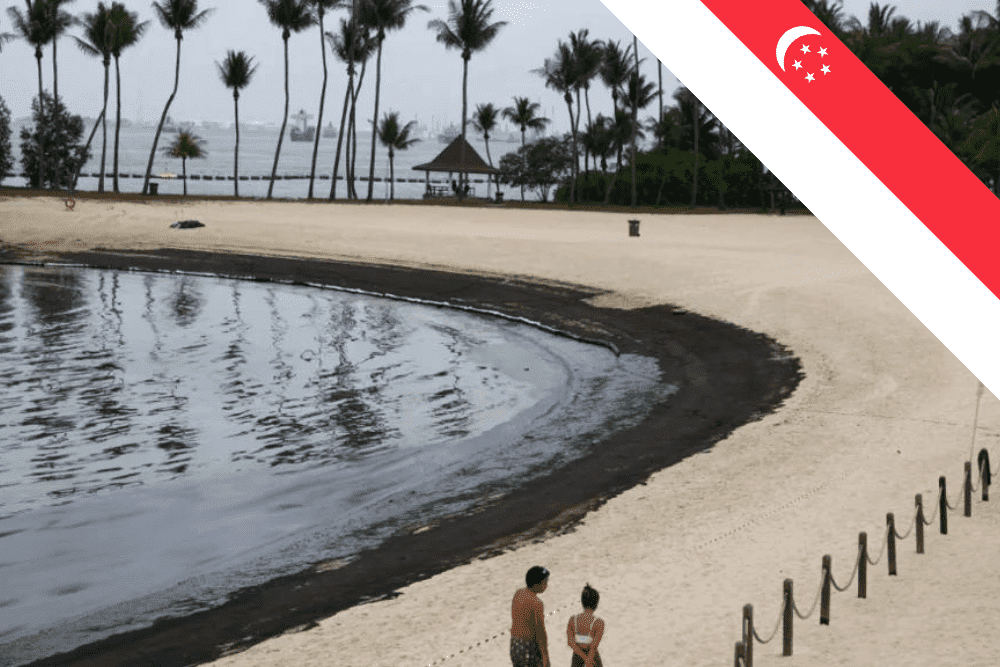Following a major oil spill in Singapore, several beaches, including Sentosa’s Palawan Beach, are now off-limits.
Discover the health hazards and environmental dangers from the oil spill in Singapore that make swimming in these waters a serious risk.
Immediate Beach Closures and Clean-Up Efforts
On June 14, a significant oil spill occurred in Singapore when the dredger Vox Maxima collided with the bunker vessel Marine Honour at Pasir Panjang Terminal. The impact caused oil from a damaged cargo tank to spill into the waters, prompting an urgent response.
By 3:30 pm, the Maritime and Port Authority (MPA) alerted the Sentosa Development Council (SDC). Several hours later, SDC began cordoning off affected areas of Palawan Beach. Clean-up efforts started early the next morning to prevent the oil from spreading further and to minimise environmental damage.
Health Hazards of Swimming in Oil-Contaminated Waters
Swimming in oil-contaminated waters poses serious health risks. Oil spills typically introduce harmful substances into the water, such as hydrocarbons and heavy metals. Direct contact with these chemicals can lead to skin irritation, rashes, and chemical burns. Prolonged skin exposure may also cause dermatitis and other chronic skin conditions.
Inhalation of toxic fumes from the spill can result in immediate respiratory problems, including shortness of breath, coughing, throat irritation, and wheezing. Individuals with pre-existing respiratory conditions, such as asthma, may experience exacerbated symptoms, potentially leading to severe health complications.
Ingesting contaminated water, even in small amounts, can cause gastrointestinal issues like nausea, vomiting, and diarrhoea. Long-term exposure to contaminated water can lead to more severe health effects, including liver and kidney damage due to the accumulation of toxic substances.
Children and pregnant women are particularly vulnerable to these health effects. Exposure to toxic chemicals can adversely affect foetal development, leading to developmental disorders. Children are more susceptible to the harmful effects of these chemicals due to their smaller body size and developing systems.
These risks highlight the importance of avoiding any contact with oil-contaminated waters to prevent immediate and long-term health issues.
Environmental Impact of the Oil Spill in Singapore
The oil spill in Singapore has caused significant environmental damage, particularly affecting marine ecosystems. Oil spreads quickly over the water surface, forming a slick that can suffocate marine life and damage habitats. Fish and other marine organisms absorb toxic substances from the oil, which can lead to developmental issues, reproductive failure, and death.
Coral reefs, which are already vulnerable, suffer greatly from oil contamination. The toxic components of oil can kill coral polyps and hinder their ability to reproduce. This damage can disrupt the entire marine food chain, as many species rely on coral reefs for food and shelter.
Mangroves, which serve as crucial nurseries for many marine species, are also at risk. Oil coats the roots of mangroves, restricting their ability to exchange gases, which can eventually lead to the death of these plants. The loss of mangroves impacts the biodiversity of coastal areas and reduces natural coastal defences against storms and erosion.
Birds and marine mammals are particularly vulnerable to oil spills. Oil can coat the feathers of birds, reducing their ability to fly and maintain body temperature. This often leads to hypothermia and death. Marine mammals, such as dolphins and seals, can suffer from ingestion of oil while grooming or feeding, leading to internal injuries and poisoning.
Efforts to mitigate the environmental impact include deploying containment booms to limit the spread of oil, using skimmers to remove oil from the water surface, and applying chemical dispersants to break down the oil. However, these methods have their own environmental risks and limitations. Long-term monitoring and restoration efforts are necessary to fully address the damage caused by the spill.
Safety Measures and Public Warnings
In response to the oil spill in Singapore, authorities have implemented several safety measures to protect public health and minimise environmental damage.
Containment booms have been deployed to prevent the further spread of oil to unaffected areas. These booms act as physical barriers, trapping the oil on the water surface. Skimmers are being used to remove the oil from the water, reducing the amount of contamination reaching the shorelines.
Chemical dispersants are also being applied to break down the oil into smaller droplets. This enhances natural biodegradation processes, although the use of dispersants carries its own environmental risks and must be carefully managed.
Public advisories and beach closures have been issued to prevent exposure to harmful substances. Swimming and other sea activities are currently prohibited at Tanjong, Palawan, and Siloso beaches. Additionally, beaches on St John’s, Lazarus, and Kusu islands remain closed until further notice.
Authorities are continuously monitoring the situation and providing updates to the public. Residents and visitors are urged to comply with these warnings and avoid affected areas to ensure their safety and support ongoing clean-up operations.
Image credit: Reuters via BBC
References
- Cna. (2024, June 17). Affected parts of Sentosa cordoned off several hours after oil spill on Jun 14. CNA. https://www.channelnewsasia.com/singapore/sentosa-oil-spill-beaches-palawan-siloso-tanjong-cleanup-4415536
- Singapore: Oil spill closes three beaches at southern islands, cleanup ongoing | AP News. (2024, June 17). AP News. https://apnews.com/article/singapore-tanker-collision-oil-spill-660b2a426956023d0f9f97e5f3933709

